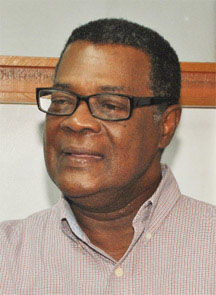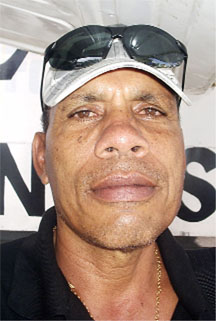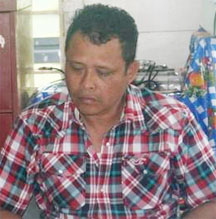President of the Guyana Gold and Diamond Miners Association (GGDMA) Patrick Harding has pledged his association will work along with the Guyana Women Miners Organisation (GWMO) to combat trafficking in persons.
“We would support the women’s miners organization; we have met with them and we have given Mrs Broomes [President of the GWMO] our support and have applauded the work they have been doing…” Harding told the Sunday Stabroek in a recent interview.

Harding, who has been a miner for years but only became the president of the GGDMA recently, said that the matter has already been addressed with the members of the association and they have indicated that they would join the fight.
“At our last meeting we told our members to work with the women’s miners organisation and we told them if such a thing is happening in their area there are mines officers and police they can report to,” he said.
Asked whether trafficking in persons was an issue that the association – which has been around for many years – had addressed in the past, Harding responded that the matter would have come up but it would not have been at the “forefront” of its activities.
According to the GGDMA head any illegal activity that miners come up against should be reported to the relevant authorities and trafficking in persons is illegal and must be reported. He said women cannot be stopped from working as prostitutes in the interior once they have the requisite paper from the Guyana Geology & Mines Commission, as every person who goes into the interior to work needs authorization from the commissioner. However, he said that where a woman is being held against her will, that is illegal and must be reported, and similarly in the case of underage girls who may be taken into the interior to work.
“But like in mining or like any activity in the interior we cannot stop women from working as prostitutes, but they need to be encouraged to protect themselves and use protection,” he said.
He admitted that some persons have been breaking the laws in the interior and he again committed to helping the women miners in their efforts to address trafficking in persons since he said the “mining industry is not open to lawlessness.”

Meanwhile, President of the GWMO Simona Broomes says she welcomes Harding’s show of support for the organisation’s work to this end, but that the ball is now in the GGDMA’s court to show whether they are serious about fighting trafficking in persons. She told the Sunday Stabroek that she had contacted Harding and asked for members of both groups to come together to fight trafficking in persons and he had agreed, something that heartened her. She said he indicated that his association was thoroughly against trafficking in persons; however, after this initial meeting it is yet to be seen what collaborative efforts the two groups can work out to fight the problem.
And Broomes said that at a recent meeting held by the organisation, which saw some 103 women miners attending from most of the mining districts, many expressed concerns about working with the GGMC and also about lands being taken away and given to Amerindians. But, she continued, trafficking in persons and health issues were two of the most discussed issues. She said many of the woman expressed gratitude about the problem of trafficking in persons being raised in the media, since they had not been aware of what it was or that it was an offence. Broomes said there was even an open confession from one woman who expressed remorse, and pledged to work with the organisation to fight trafficking.
Broomes said her members are not familiar with the laws and she was grateful for the initial workshop that had been held with members by the Ministry of Human Services & Social Security. “A lot of women talk about the human trafficking, [but] I am in mining for 20 years [and] never knew about human trafficking.”
Since its formation some months ago the GWMO has publicly stated that among the issues it would be addressing was trafficking in persons and the exploitation of women in the interior. Broomes and her members have also indicated that they would not sit idly by and see women being trafficked or exploited even if it is by other women like themselves. Only last month the women assisted in a case in Region 7 where four teenagers – two under the age of 16 – were allegedly being forced to work as prostitutes. Four persons have since been charged in that matter. The organisation will soon launch a massive campaign in many of the mining locations to sensitize women about the issue.
Region 7
Meantime two newly appointed regional chairmen of regions where mining takes place have indicated that trafficking in persons is an issue they would be addressing.
Gordon Bradford, Regional Chairman of Region Seven, who had served in the same position between 2001 and 2006, in an invited comment told the Sunday Stabroek that trafficking in persons is on the agenda for his region. He said that during his previous tenure there were two or three occasions when he had to intervene to deal with the issue, and now when he travels he would be on the lookout, although he pointed out that there is need to properly understand the offence. He has discussed the matter with his vice-chairman and he said while there has been a report of some school-age children in the Upper Mazaruni who are out of school, they cannot label these as trafficking in persons cases.

“The issue is a very technical to deal with, and unless you are trained to deal with such issues you may not know how to… handle such situations,” Bradford told the Sunday Stabroek.
Bradford said that the regional administration is ready to engage the Ministry of Human Services & Social Security to send personnel into the region to talk to councillors about the issue, since many of them are from remote areas and sensitizing them to the problem will better equip them to identify cases.
“But it is something on the agenda,” Bradford said and he recalled that during his last tenure he had cause to have two girls removed from a location and a man was arrested and charged, although not with trafficking in persons. He said one of the young women ended up living at his home for months as her family could not be located, and he did not want to just abandon her. He said after months the relatives were located and she returned to them, but she was by then calling him dad and his wife mom. Today, the girl is a housewife and she still communicates with them. “It is some very sad stories that many young women end up in these positions, and sometimes it is parental neglect,” Bradford said, going on to observe that in many cases when rescued the children should not be returned to what they call home, as they would again be placed at risk, although sometimes there was no adequate alternative accommodation. He made mention of the four young women who were removed from the GWMO and who were placed in the state’s care but later left the shelter and returned to their homes.
“But what do we do? We need the requisite knowledge and training to deal with the issue and we need accommodation for women who are victims,” he said.
Region1
And while Regional Chairman of Region One Paul Pierre said that trafficking in persons is on his administration’s agenda, he said it is something about which the populace needs education.
He has attended a few workshops on the issue, and he said there are different views about what trafficking in persons really is. To say that it exists in his region might be wrong, therefore, but then to say it does not might be wrong too. He said there is need for statistics to be available to show the extent of the problem, and for this to be done persons would have to understand what the offence is. Pierre said that in the Mabaruma area of itself there is not much mining as this takes place in the Matarkai sub-region, but persons from Mabaruma may be solicited and taken into the mining areas.
According to Pierre there are cases of young women and men being taken into the backdam to work, but he questioned whether that is trafficking in persons or rather exploitation.
Pierre said that he has been having talks with the probation officer in the region in the hope that the Ministry of Human Services & Social Security would send persons to educate residents about the issue.
“It is something that we want to address but we don’t want it to suddenly be blown out of proportion,” he said.





